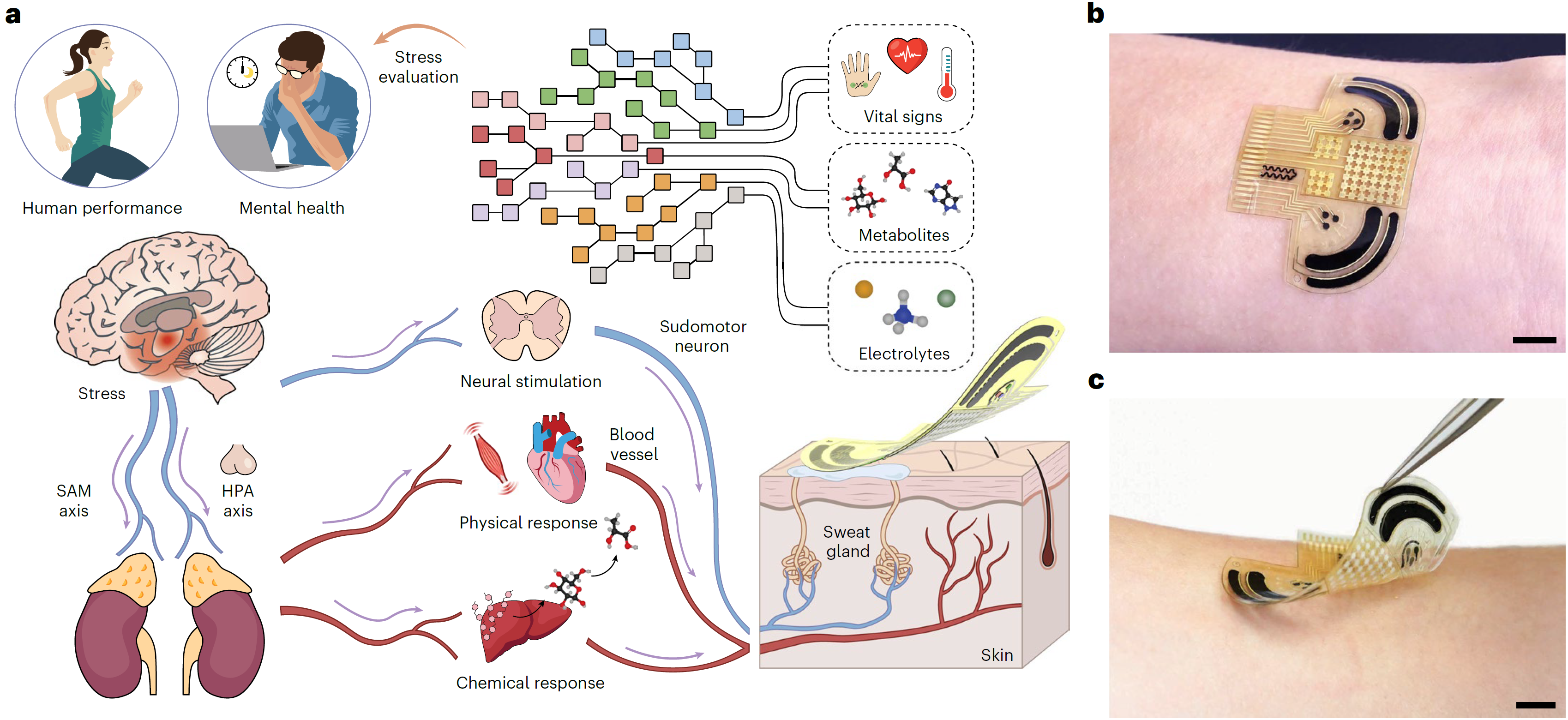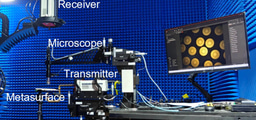Evaluating Stress with Artificial Intelligence-Powered Electronic Skin
Published in Bioengineering & Biotechnology, Computational Sciences, and Behavioural Sciences & Psychology

Stress and anxiety. The leading contributor of modern society
In today's fast-paced world, stress has become a ubiquitous aspect of daily life, particularly accentuated in the aftermath of the COVID-19 pandemic. This period has seen a marked rise in stress-related mental disorders, such as anxiety and depression, significantly contributing to the global health burden. The pandemic has not only intensified these conditions but also underscored the urgent need for greater stress awareness and effective evaluation methods. Despite the growing recognition of such demand, the resources and capabilities to adequately address these mental health challenges remain insufficient. There is an increasing demand for innovative approaches to understand, monitor, and manage stress in our modern society.
Stress evaluations: Are questionnaires the only solution?
Despite the global prevalence of stress, approaches to quantify stress have traditionally been limited. The clinical gold standard for stress evaluation primarily relies on subjective surveys and questionnaires. These methods, while insightful, are time-consuming and require extensive follow-ups, placing a considerable burden on both individuals and mental health professionals. This reliance on self-reported data can lead to inaccuracies due to the subjective nature of personal perception and recall bias. As stress and its manifestations are highly individualized, there is a growing need for more objective, reliable, and scalable methods to evaluate stress levels, which could complement the existing questionnaire-based assessments.
Multimodal sensors: An alternative strategy
Electronic skin, in the form of integrated soft wearable platform, consists of various sensors and materials mimicking human skin. This technology represents a paradigm shift in monitoring physiological responses. Stress manifests as a complex biological response, engaging the nervous, endocrine, and immune systems—a multifaceted nature that is not fully captured by physical sensors alone in existing commercial wearables, which primarily track overt physical responses such as heart rate. These wearables, while useful, often fail to provide a comprehensive view of stress, neglecting the interplay between physiological and psychological factors and individual variances in stress response. The introduction of multimodal sensors in electronic skin technology addresses this gap. Capable of measuring a broader range of physiological and biochemical signals, these sensors offer a more nuanced and all-encompassing assessment of stress. This advancement holds the promise of bridging the gap between observable stress symptoms and underlying multimodal biomarkers, facilitating a more accurate and personalized approach to stress evaluation, a leap forward from the limitations of current wearable technologies.

Fig. 1. A consolidated artificial intelligence-reinforced electronic skin (CARES) for stress response monitoring. a, Stress assessment by continuous monitoring multimodal physiological and biochemical response from skin using CARES platform. b,c, Optical images of a CARES attached to the skin of a human subject.
Data collection using CARES platform
To effectively collect robust multimodal data, the CARES platform addresses the critical challenge of sensor stability in long-term continuous wearing. For physical sensors, a primary concern is their sensitivity to motion-induced artifacts, a common issue that can significantly skew data accuracy. The CARES platform mitigates this through a design that ensures a stable, close-fitting interface with the skin, minimizing the impact of movement on sensor readings. Simultaneously, for biochemical sensors, the platform tackles the long-standing challenge of maintaining operational stability in biofluids. We looked into the sensing mechanisms, and designed a universal material strategy that stabilized sensor interfaces using analogous composite materials. The resulting sensors offer long-term sweat biomarker analysis of more than 100 h with high stability. As a demonstration, we showed that such CARES platform can provide continuous multimodal physicochemical monitoring over a 24-hour period during different daily activities, as well as during controlled stressor studies.
Stress assessment using machine learning
To effectively manage the extensive volume of data derived from previously inaccessible multimodal sources, we have implemented a machine learning pipeline engineered for more intelligent and objective data analysis. This pipeline is designed to execute three distinct tasks: stress detection, stressor type classification, and anxiety level prediction, the latter being a crucial psychological response to stress. Our approach demonstrates that the physicochemical sensor data collected via CARES platform, can be leveraged to accurately classify responses to different types of stressors. Furthermore, this data proves reliable in quantifying state anxiety levels. These capabilities showcased the power of machine learning in transforming raw multimodal sensor data into precise, actionable insights.
Conclusion
The CARES system epitomizes the future of AI-powered wearable electronics in personalized healthcare, utilizing multimodal sensors that adeptly combine physical and biochemical markers. The approach we developed for biochemical sensors can serve as a universal and readily reconfigurable method for other targets in biofluids. This versatility paves the way for a broad spectrum of practical applications, underlining the system's potential to revolutionize personalized healthcare through advanced, AI-integrated technology.
Follow the Topic
-
Nature Electronics

This journal publishes both fundamental and applied research across all areas of electronics, from the study of novel phenomena and devices, to the design, construction and wider application of electronic circuits.






Please sign in or register for FREE
If you are a registered user on Research Communities by Springer Nature, please sign in